Factbox: What is President-elect Pezeshkian's stance on Iran’s foreign policy priorities?
By Alireza Akbari
Iran’s president-elect Masoud Pezeshkian will be assuming office in the coming weeks after receiving a decree of validation from the Leader of the Islamic Revolution followed by the inauguration in parliament.
Efforts are already in full swing to form the next cabinet and formulate strategies to implement the plans as delineated by the newly-elected president during his election campaigning.
A relatively low-profile political figure, Pezeshkian previously served as a lawmaker and health minister and was always at the forefront of defending issues of national interest.
A closer examination of his political activities and statements over the years reveals his unflinching commitment to the principles of the Islamic Revolution and steadfast loyalty to Ayatollah Seyyed Ali Khamenei, the Leader of the Islamic Revolution as well as the Iranian nation.
Faith in Leader and Revolution
Following his win in the presidential runoff election, the president-elect addressed a large gathering of people at the mausoleum of Imam Khomeini, the founder of the Islamic Revolution.
There, he renewed his commitment to Imam Khomeini's revolutionary ideals and extolled the guidance and support of Ayatollah Khamenei, vowing to take the country to greater heights.
The same day, he had a five-hour meeting with Ayatollah Khamenei, in which the Leader hoped the president-elect would leverage the nation's resources towards more progress and prosperity.
During the election campaign and before that, the former health minister and veteran lawmaker representing the northwestern city of Tabriz never minced words when it came to national interest.
During a meeting with students at Tehran University in mid-June, in the run-up to the June 28 election, Pezeshkian acknowledged his profound faith in the leader and his leadership.
On his strategy to implement the 7th development plan, Pezeshkian emphasized the imperative of aligning the new government initiatives with the Leader's “general policies.”
In the first runoff debate, the president-elect elucidated his foreign policy vision, emphasizing the continuity of the stances of the Leader and Imam Khomeini, which is “neither East nor West.”
IRGC as the nation’s protective shield
Pezeshkian’s belief in the role of the Islamic Revolution Guard Corps (IRGC) in safeguarding the country’s sovereignty and fostering national unity has been consistent throughout his tenure as a lawmaker.
In early December 2022, during his term as the deputy speaker of the parliament, he lauded the contributions of the IRGC, emphasizing its indispensable role in “preserving the nation's integrity.”
“We owe a debt of gratitude to the IRGC. Without their presence, our country would have faced severe fragmentation 100 times over,” he said at the time, paying glowing tribute to the Guards.
“We must acknowledge and appreciate the defenders of our land and our dignity.”
Responding to then-US President Donald Trump, who …directed towards the Islamic Republic, Pezeshkian underscored the unifying effect of external threats on the Iranian populace.
“Such hostile declarations serve to unite and strengthen our nation's resolve,” he remarked at the time.
He emphasized the importance of setting aside internal differences and heeding the directives of the Leader of the Islamic Revolution in the face of external adversaries.
Soleimani, the anti-terror hero
During the final televised debate of the run-off presidential election, Pezeshkian paid a rich and glowing tribute to the late Iranian anti-terror commander, General Qassem Soleimani.
He characterized General Soleimani as a figure of unparalleled “national pride and a thorn in the eyes of adversaries”, referring to his role as the leader of the Axis of Resistance.
He likened ‘Hajj Qassem’ to a guiding light for the youth of the country, describing him as a "roadmap" for future generations to follow.
Highlighting the impact of General Soleimani's legacy, Pezeshkian said many of the country’s complex challenges could be tackled by adopting the same visionary perspective of General Soleimani.
He hailed the anti-terror general as a hero who fought against tyranny on foreign shores while standing as an unwavering champion for the oppressed in his own country.
During a visit to Kermanshah on his campaign trail, Pezeshkian extolled the Iranian anti-terror hero’s illustrious legacy, hailing him as a “national hero and a source of pride for Iranians worldwide.”
General Soleimani was assassinated on January 3, 2020, in a drone strike outside the Baghdad airport on direct orders of then-US President Donald Trump.
Stance on sanctions
During presidential debates, Pezeshkian articulated a strategic approach to navigating problems, including sanctions imposed on the Islamic Republic, emphasizing the critical need for such approaches.
On commitments under the Joint Comprehensive Plan of Action (JCPOA) in the event of non-compliance by the US, Pezeshkian asserted the necessity of maintaining “multiple negotiation options” to uphold the principles of "dignity," "wisdom," and "expediency" outlined by the Leader.
During the second televised debate of the presidential run-off, Pezeshkian pledged to implement measures aimed at lifting sanctions while continuing interactions with the world.
His stance on US sanctions has been consistent and unwavering throughout his political career.
In January 2019, while serving as the deputy speaker of parliament, Pezeshkian in unequivocal terms criticized sanctions imposed by the US as “unjust.”
In a meeting back in September 2015 to assess the JCPOA, Pezeshkian lauded the country's “nuclear advancements,” saying these achievements “compelled the US to engage in negotiations.”
During his election campaigning, he stated that success in governance hinges on having “a range of feasible options” to overcome obstacles and underscored the imperative of nurturing regional and international ties to advance national objectives.
Stressing the pivotal role of neighboring states in Iran's diplomacy, Pezeshkian outlined his commitment to a foreign policy focused on fostering economic growth and enhancing security through robust regional cooperation.
Neighborhood first policy
He emphasized the need to manage relationships with “neighboring countries based on shared interests and common ground.”
Following his victory in the run-off election with a significant mandate of 16.4 million votes, global leaders and high-ranking officials extended their congratulations to the president-elect.
Central to these messages was a consistent theme of reinforcing and expanding mutual relations between Iran and its neighbors, signaling a continuation and potential deepening of the Eastward policy trajectory initiated by his predecessor Ebrahim Raeisi.
In a conversation with Pakistani Prime Minister Shehbaz Sharif, Pezeshkian emphasized the importance of Tehran-Islamabad relations and urged for further collaboration.
Similar sentiments were echoed in phone calls with Russian President Vladimir Putin and Turkish President Recep Erdogan, underscoring the need to strengthen ties and cooperation in the region.
In another open letter addressed to Arab nations earlier this week, Iran's President-elect Pezeshkian voiced his commitment to strengthening diplomatic relations with all neighboring Persian Gulf states.
Published in Al-Araby Al-Jadeed news outlet, the letter emphasized the common ground and mutual interests that Iran shares with its Muslim and Arab neighbors on international and regional issues.
He called for “collective action” in addressing the longstanding issue of Palestinian occupation, expressing respect for the “resilience of the Palestinian people in the face of Israeli aggression.”
“It is on us,” the letter read, “to address the longstanding issue of the occupation of Palestine and work towards healing this enduring wound.”
It further emphasized that the Islamic Republic acknowledges and respects the steadfast resistance of the Palestinian people against the barbaric onslaught of the Israeli regime.
Furthermore, Pezeshkian highlighted the pressing need for cooperation in combating terrorism and extremism, viewing this as a shared challenge for countries in the region.
He emphasized the importance of regional and global cooperation in working towards a West Asia free from weapons of mass destruction, cautioning against the destabilizing threat posed by the “Zionist regime's nuclear arsenal.”
Support for resistance
As a sign of continued support and synergy between Iran and the Axis of Resistance, Pezeshkian received congratulatory messages from many resistance movements following his victory.
Secretary-General Sayyed Hassan Nasrallah of the Lebanese resistance movement Hezbollah conveyed warm congratulations to Iran’s president-elect in a message.
Nasrallah's message, issued on Saturday, expressed heartfelt felicitations to the president-elect and the people of Iran, invoking divine blessings for Pezeshkian's protection, guidance, and success.
In reply, Pezeshkian extended sincere appreciation for the message from the esteemed 63-year-old Lebanese resistance leader, affirming Iran's steadfast commitment to supporting the Axis of Resistance.
Emphasizing that this commitment is deeply entrenched in Iran's core principles, Pezeshkian underscored the enduring legacy of the late Imam Khomeini and the unwavering guidance of Ayatollah Seyyed Ali Khamenei, the Leader of the Islamic Revolution.
In a message to Hamas leader Ismail Haniyeh on Wednesday, the Iranian president-elect reassured him of the final victory of the Palestinian resistance against the Israeli occupation amid the genocidal war on Gaza that has completed nine months and claimed around 38,000 lives.
Pezeshkian said he is certain that the resisting people of Palestine and their historic steadfastness, as well as the heroic diligence of the fighters of the Palestinian resistance will pave the way for their triumph and divine victory against the Israeli occupation.
He also pledged “all-out support” on the part of the Islamic Republic for the oppressed Palestinian nation “until the realization of all of its ideals and rights as well as the liberation of the noble al-Quds.”
Significance of national unity, stability
Pezeshkian, who represented the city of Tabriz in the 8th, 9th, 10th, and 11th parliaments, emphasized that national unity is paramount in addressing the country's internal and external challenges effectively.
During a televised cultural roundtable on June 19, amid the election campaign, Pezeshkian underscored the need to align with the policies outlined by the Leader, warning against deviation from them.
It demonstrated his unwavering commitment to viewing the Leader's general policies as a blueprint for taking the country to greater heights of peace, prosperity and progress.
Also, in an interview with state broadcaster IRIB on June 10, he advocated for “stability” in legislative and decision-making processes within the government.
Pezeshkianunderscored the significance of stability as a fundamental aspect of adhering to the general policy framework set out by the Leader, asserting that any fluctuations or shifts in these policies could “impede the country's ability to attain the envisioned growth under the Leader's guidance.”
With a focus on implementing the seventh development plan, Pezeshkian stressed the necessity of “prioritizing the alignment of government actions with the Leader's policies.”
He emphasized that for the executive branch, the primary objective should be advancing under these general policies to effectively steer the nation towards its desired developmental trajectory.
Consensus in the country
Just three days prior to the snap election on June 28, Pezeshkian unveiled his strategic political framework during the fifth televised debate, centered around the core principle of "consensus."
This foundational principle, he argued, would serve as a catalyst in “bridging the divide between the government and the people,” fostering unity and understanding within the political landscape.
Pezeshkian emphasized his commitment to a governance model driven by “expertise, transparency, and accountability.”
By prioritizing these pillars of good governance, he aimed to instill a sense of trust and credibility in the functioning of the government, fostering positive engagement and collaboration with the public.
Furthermore, he reiterated his steadfast dedication to advancing national interests with a strategic approach characterized by "dignity," "wisdom," and "expediency."
This resounding commitment to conducting foreign affairs with integrity, prudence, and efficiency underscored his vision for upholding Iran's stature and aspirations on the global stage.
Dec. 21: ‘Axis of Resistance’ operations against Israeli occupation
Spain jurists demand ties with Israel ties be cut
VIDEO | Press TV's news headlines
VIDEO | Iran honors top Science Olympiad medalists
VIDEO | Austrians arrested at Gaza protest in Vienna
10 killed in bus crash in western Iran
VIDEO | One-man-band journalism with Civili
5 Israeli forces killed as Palestinian fighters face up to regime’s war machine


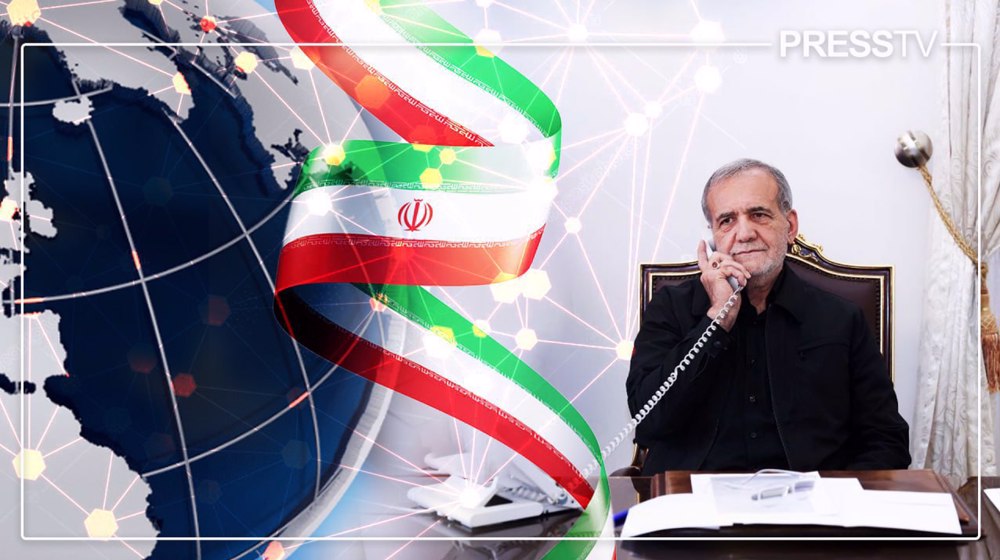


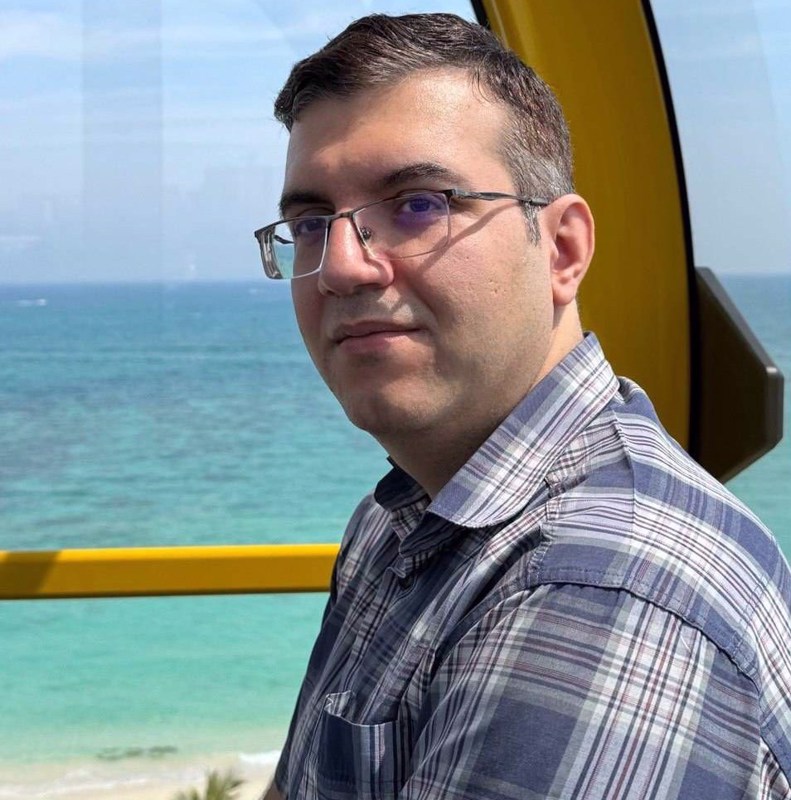



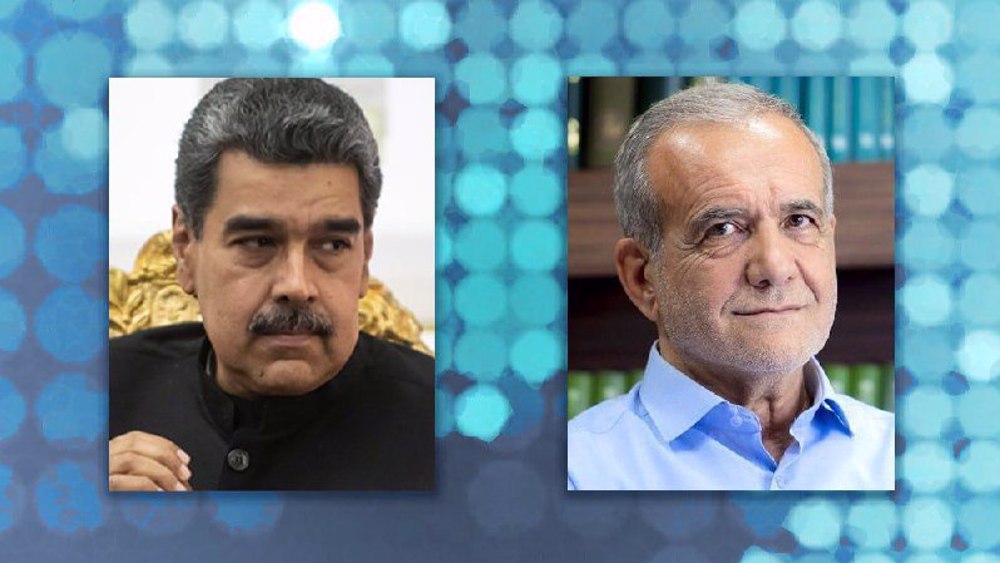
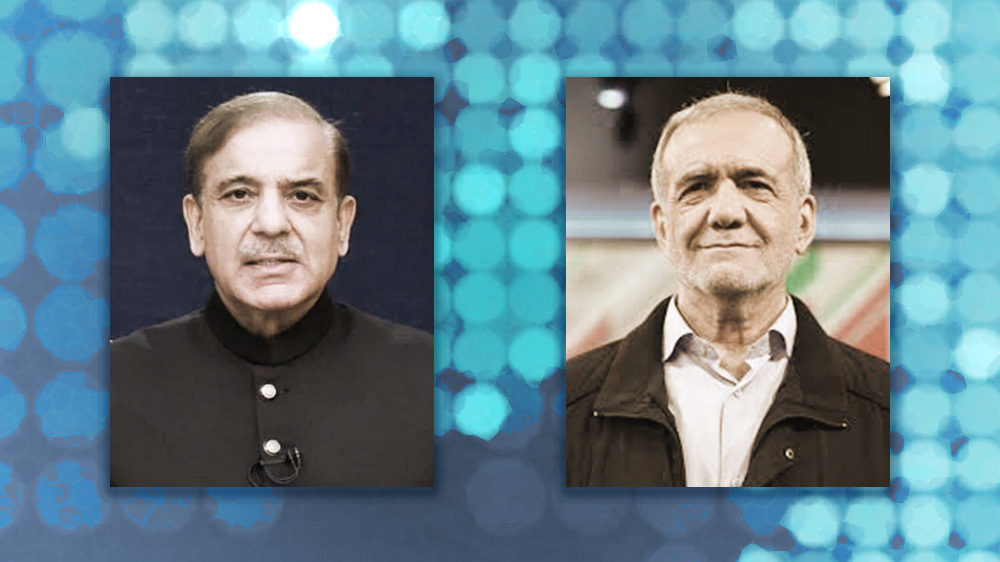
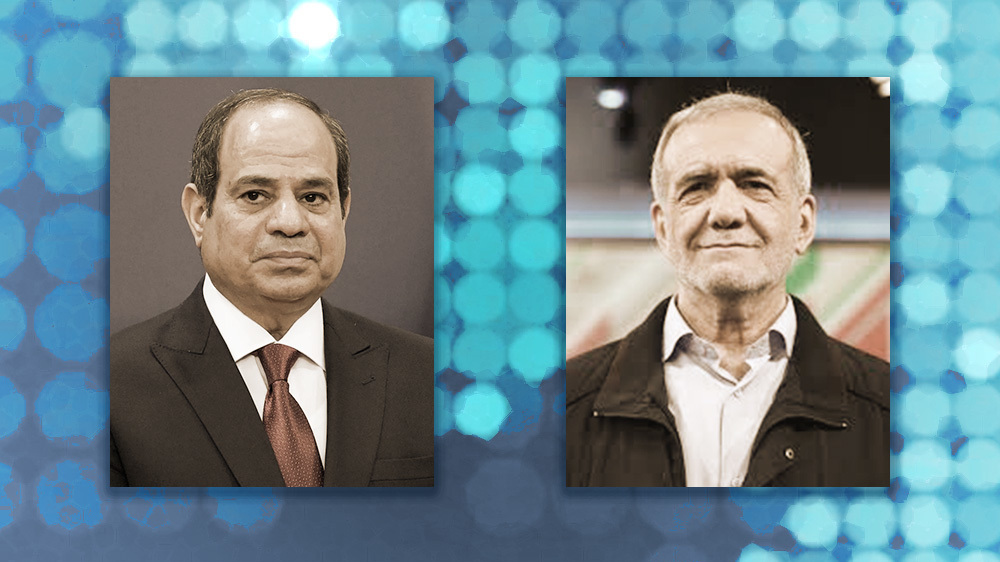
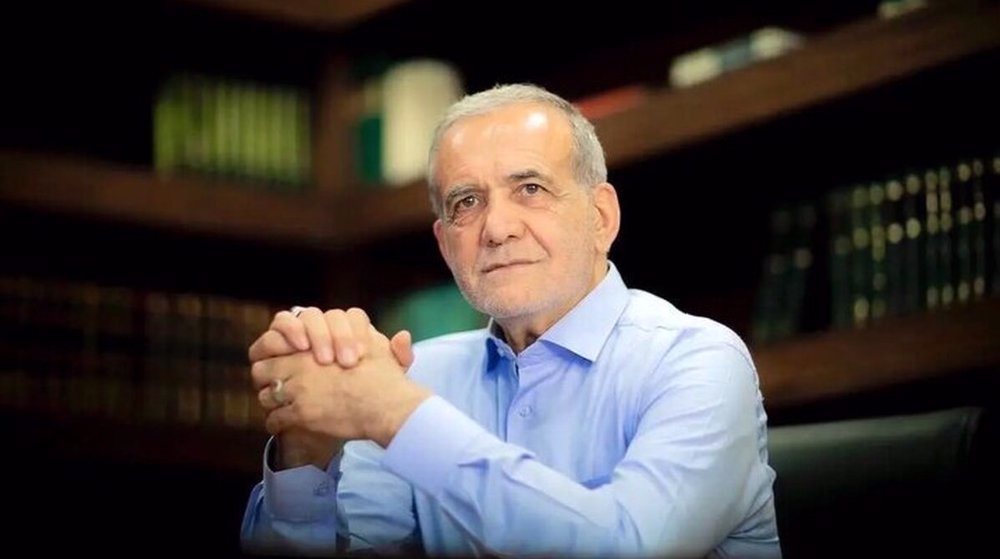
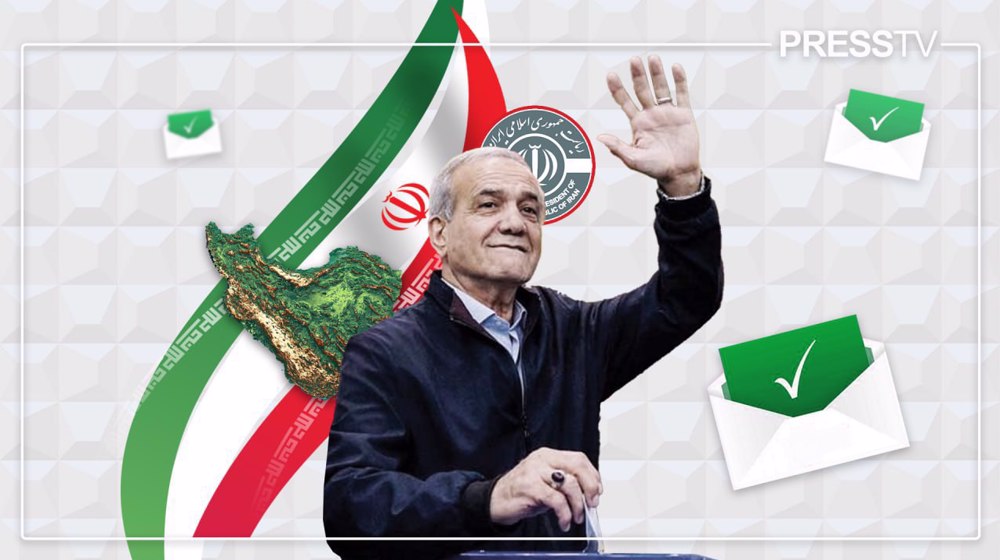
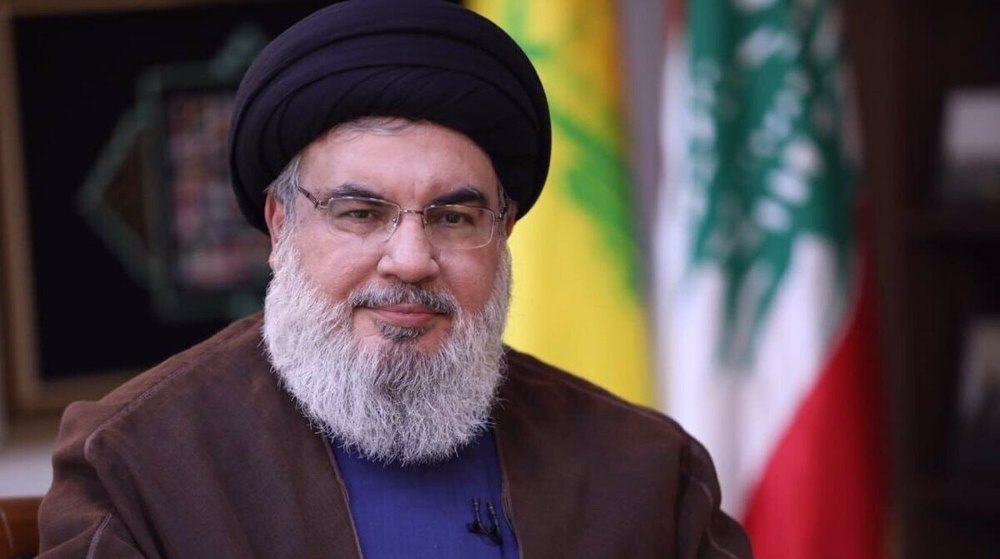

 This makes it easy to access the Press TV website
This makes it easy to access the Press TV website